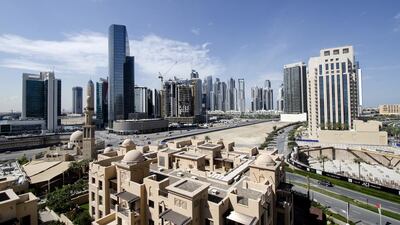The increasing allure of holiday homes, especially in Dubai, was one of the important trends affecting the hotel market this year.
Holiday homes have become popular not just with tourists but with expats unable or unwilling to pay a year’s rent in advance.
Combined with an ever-increasing supply of hotel rooms, holiday homes have increased the pressure on prices, particularly in the mid-market range.
Some of the major beneficiaries are homeowners in areas of Dubai, such as Downtown Dubai and Palm Jumeirah, who cash in by letting out their homes.
“There is a growing trend of inbound tourists looking [to] live like a local, meaning they are now more comfortable booking a private residence in a local community with a reputable holiday-home operator,” said Imran Latif, a business development consultant at Hometown, which operates 100 holiday homes in Dubai.
The holiday-homes boom in Dubai began in 2013, when the emirate regulated the market. The sector remains unregulated in the other emirates.
For hotel operators, this competition from an outside source comes as they continue to step up their intramural competition by continuing to add hotel rooms across the country.
In Dubai, 18 new hotels added 6,733 rooms during the first 11 months of the year, according to consultancy JLL. About 40 per cent of these were in the luxury category, including Westin Dubai, Wyndham Dubai Marina and Jumeirah Al Naseem. Some of the other major hotel openings include Al Habtoor hotel complex on Sheikh Zayed Road that includes the 254-room St Regis Dubai, the region’s largest Westin with about 1,000 rooms and the 356-room W Dubai – Al Habtoor City. The four-star, 320-room Metropolitan Hotel Dubai opened last month. On City Walk Dubai, Marriott opened its La Ville Hotel and Suites with 88 rooms and 68 apartments this month.
In Abu Dhabi, five hotels opened up to November, which added 1,296 rooms. Of these 51 per cent were in the luxury category, including the Four Seasons Al Maryah Island, Jannah Hotel’s Al Seef Resort by Andalus and Marriott Hotel Downtown.
“If the wider market conditions do not change considerably over the next 12 months, it is unlikely that average rates of hotels will rise over the next year,” said Ali Manzoor, an analyst at consultants Knight Frank. “This is particularly true for Abu Dhabi, which has had a historical dependence on oil-related corporate tourism and a significant amount of anticipated supply in the pipeline.”
Room rates in Dubai fell by 10.5 per cent in the first 10 months this year, compared with the same period last year, according to JLL. In Abu Dhabi, the average rate decline was 9.9 per cent for the same period.
Mr Manzoor said the growth in the number of holiday homes will be modest next year.
Dubai Tourism said it had approved 1,805 holiday-home units up to October. This year, it also allowed private homeowners to apply for a holiday-home permit and start leasing their properties directly.
Between May, when the regulations were updated, and October, 109 homeowners submitted applications for a holiday-home permit, of which 39 were approved. They join 78 previously approved holiday-home operators in Dubai.
In Dubai, homeowners can only rent out entire units. Room renting is not allowed.
The stock of holiday home units in Dubai stands below 5 per cent of total hotel room supply, making the effect less severe than global markets, according to consultancy Knight Frank.
“The impact on the hotel sector is more prevalent in the budget sector and local brands, [as] holiday homes cannot compete with the facilities and services delivered by some of the bigger hotels like Jumeirah Beach Hotel or even the exuberance of the Burj Al Arab,” Mr Latif said.
The biggest effect of the holiday-home sector was to restrict the ability of hotels to increase rates during peak demand, according to analysts. The competition with hotels is mostly felt in areas such as Dubai Marina, Palm Jumeirah, Jumeirah Beach and Downtown Dubai that have a large number holiday homes on offer.
About 83 per cent of the approved holiday homes are rated standard and 17 per cent deluxe, according to Dubai Tourism in October.
The holiday-home regulations are a part of the emirate’s strategy to diversify room offerings to house 20 million visitors a year by 2020, the year when the emirate will hold the world expo.
On the economic front, the US Federal Reserve’s decision on December 14 to increase its benchmark rate looks like more bad news for UAE hotel operators. The rate hike has lifted the US dollar. That means that hotel rooms in the UAE, where the currency is pegged to the dollar, are more expensive for visitors whose national currencies are not dollar-pegged.
Most analysts expect the dollar to keep on rising in 2017.
“It is likely that the increased supply will apply downward pressure on rates to a greater degree than any anticipated increase in the value of the dollar against the currencies of the major source markets for the UAE,” said John Podaras, a partner at the hospitality consultancy Hotel Development Resources in Dubai.
ssahoo@thenational.ae
Follow The National's Business section on Twitter

